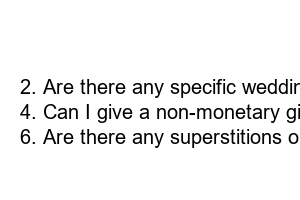지역별 결혼 축하금
Title: Wedding Gift Money by Region: A Cultural Guide to Celebratory Generosity
Introduction:
Weddings are joyous occasions filled with love, laughter, and the joining of two souls. While the ceremonies are diverse, one aspect that transcends cultural boundaries is the act of gifting money to the newlyweds. However, the customs and expectations surrounding wedding gift money can vary greatly depending on the region. In this blog post, we delve into the fascinating world of wedding gift traditions from different parts of the globe.
1. Asia: A Map of Generosity
From India to Japan, **Asia is a continent with a rich tapestry of cultures and customs**. In many Asian countries, it is customary to provide monetary gifts known as “red envelopes” that symbolize good luck and financial prosperity. The amount varies based on factors such as the guest’s relationship to the couple and their socio-economic status.
2. Europe: Embracing Elegance and Tradition
In Europe, wedding gift customs differ by country. In countries such as Germany and the Netherlands, guests often contribute a fixed amount towards a **”Wishing Well”**, a decorated box or jar where they drop their monetary gifts. Meanwhile, Mediterranean countries like Italy and Greece often give gifts of cash during the wedding reception, which are collected in a decorated bag or box.
3. Africa: Celebrating Community and Togetherness
African weddings are renowned for their vibrant festivities and communal spirit. In many African cultures, guests **gift money directly to the couple** during the celebration. The amount often depends on factors like the couple’s financial needs and the guests’ relationships with them. The gift of money signifies solidarity and support for the newlyweds’ future.
4. Americas: Dollars and Sense
Wedding gift customs in the Americas range from practical to symbolic. In North America, it is common to give monetary gifts that help set up the couple’s new home. Guests often contribute to **”honeyfunds”** or **online registries** aimed at funding the couple’s honeymoon experiences or future wishes.
5. Oceania: Cultural Nuggets from Down Under
In Australia and New Zealand, guests contribute to the couple’s **”wishing well”** or **”money tree”**, where envelopes filled with money are placed. Additionally, guests are encouraged to write personalized messages attached to their monetary gifts, adding a heartfelt touch to their donations.
6. The Middle East: Celebrating Love and Prosperity
Wedding gift traditions in the Middle East vary across different countries. In some regions, guests present the couple with gold or jewelry, symbolizing wealth and blessings. Others follow the tradition of “Shower of Coins,” where guests shower the newlyweds with money as a gesture of celebration.
Conclusion:
Wedding gift customs are as diverse and enchanting as the love stories they accompany. Whether it’s the red envelopes of Asia, the Wishing Well of Europe, or the Shower of Coins in the Middle East, **the act of giving money is a heartfelt expression of love, support, and celebration**. So, as you attend weddings across the world, remember to embrace the local customs and contribute to the couple’s happiness in a way that makes their special day even more memorable.
Summary:
This blog post explores wedding gift customs from different regions worldwide, providing insights into the diverse ways guests express their love and celebrate newlywed couples. From the red envelopes of Asia to the money trees of Oceania, the blog highlights the various traditions and cultural significance associated with gifting money at weddings. Understanding these customs allows us to partake in the celebrations honorably and enhance the joyful atmosphere.
FAQs:
1. What is the appropriate amount to gift at a wedding?
2. Are there any specific wedding gift traditions I should know about?
3. Is it rude to give money as a wedding gift in certain cultures?
4. Can I give a non-monetary gift instead of money?
5. How should I present the monetary gift at the wedding?
6. Are there any superstitions or beliefs associated with wedding gift money in different cultures?

